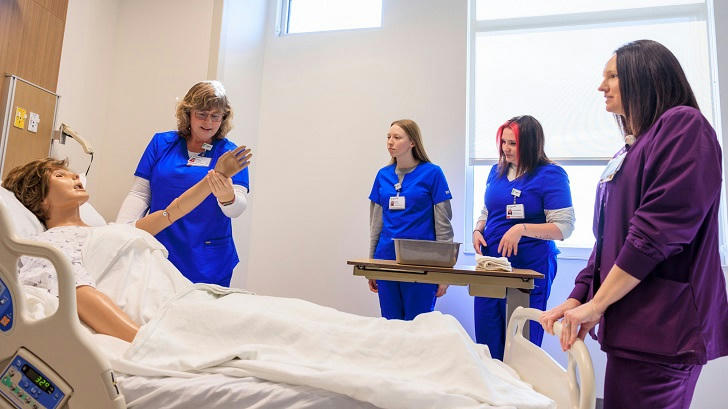CNA training programs your gateway to a rewarding healthcare career
Certified Nurse Assistants (CNAs) are the unsung heroes of the healthcare industry. They provide critical support to patients and medical teams in hospitals, nursing homes, and private residences. With an aging population and increasing healthcare demands, the need for skilled CNAs is growing at an unprecedented rate. Choosing this career not only offers job security but also allows individuals to make a tangible difference in people's lives.

Understanding the Role of a CNA
A CNA's responsibilities are multifaceted, encompassing both physical and emotional support for patients. On a typical day, CNAs assist with personal care tasks such as bathing, dressing, feeding, and toileting. They also help patients move safely, whether it's transferring from a bed to a wheelchair or providing assistance during physical therapy sessions.
In addition to these practical tasks, CNAs are trained to monitor vital signs like blood pressure, pulse, and temperature. They keep detailed patient records and communicate any changes in condition to nurses and doctors. This makes them an integral part of the healthcare team, ensuring that patients receive timely and appropriate care.
Beyond clinical tasks, CNAs often provide companionship and emotional support, especially for elderly or long-term care patients. Their presence can alleviate anxiety and bring comfort during challenging times, making their role as much about humanity as it is about healthcare.

The Importance of Training Programs
CNA training programs are designed to prepare individuals for these varied and demanding responsibilities. Most programs last 6-12 weeks and combine classroom instruction with hands-on clinical experience. Key topics covered include:
Patient Safety and Hygiene: Techniques for maintaining cleanliness and preventing infections.
Anatomy and Physiology: Understanding the basics of human health and bodily functions.
Communication Skills: Learning how to interact effectively with patients, families, and healthcare teams.
Ethics and Patient Rights: Understanding the legal and ethical responsibilities of caregiving.

Practical training takes place in simulated environments or healthcare facilities, where students practice skills like transferring patients, feeding them, and taking vital signs under supervision.
Career Opportunities and Advancement
Once certified, CNAs have a wide range of career options. They can work in hospitals, long-term care facilities, home healthcare, rehabilitation centers, or even hospice care. The flexibility of the role allows CNAs to choose a work environment that aligns with their interests and strengths.
For those looking to advance their careers, CNA experience serves as a stepping stone to roles such as Licensed Practical Nurse (LPN) or Registered Nurse (RN). These positions require additional education but offer higher salaries and increased responsibilities.
The Personal and Professional Rewards
Being a CNA is more than just a job; it's a calling. CNAs have the unique opportunity to make a difference in their patients' lives every day. Whether it's providing comfort to an elderly patient or helping someone recover from surgery, the work is both impactful and fulfilling.

Case 1: From Odd Jobs to CNA in Maternal and Infant Care
Background:
Sophia, a young mother, had to rely on temporary jobs to support her family. She was interested in maternal and infant health and wanted to find a career in this field.
Turning Point:
Sophia enrolled in a CNA training program that specialized in maternal and infant care, where she learned about newborn care, breastfeeding support, and postnatal care. After completing the course, she was hired by a local maternity hospital.
Outcome:
Sophia's starting hourly wage was $24, with flexible working hours that allowed her to balance work and family life. Her passion for maternal and infant care earned her trust from patients and colleagues, and she plans to pursue a midwifery program to further her career.
Case 2: From Store Cashier to CNA in High-End Senior Care
Background:
David worked as a cashier at a convenience store, a job that was monotonous and low-paying. He wanted a more meaningful career with better financial prospects.
Turning Point:
David enrolled in a CNA program with a focus on senior care, where he learned how to provide personalized care, including emotional support and activity planning for elderly patients. After completing the course, he was hired by an upscale senior living community, providing care for elderly patients from wealthy families.
Outcome:
David's hourly wage increased to $26, and he received additional benefits. He enjoyed a comfortable working environment and positive client relationships. He plans to pursue further training to become a care supervisor, opening up more career opportunities.
Case 3: From Hotel Server to CNA in Hospice Care
Background:
Emily, a 25-year-old hotel server, had extensive experience in customer service but found the work unfulfilling. After witnessing a family member's experience with hospice care, she was inspired to shift toward a healthcare career.
Turning Point:
Emily enrolled in a CNA course with a special focus on hospice care, learning how to provide physical and emotional support to both patients and their families during end-of-life care. After completing the program, she secured a position at a hospice care facility.
Outcome:
Emily's hourly wage started at $20, and she found deep personal satisfaction in her work. Her compassionate approach earned her respect from patients and colleagues. She plans to pursue additional training to become a hospice nurse, providing high-quality care to more patients in need.
In a world where healthcare is becoming increasingly important, CNAs stand out as essential contributors to patient well-being. For anyone passionate about helping others, CNA training is the first step towards a rewarding and meaningful career.
